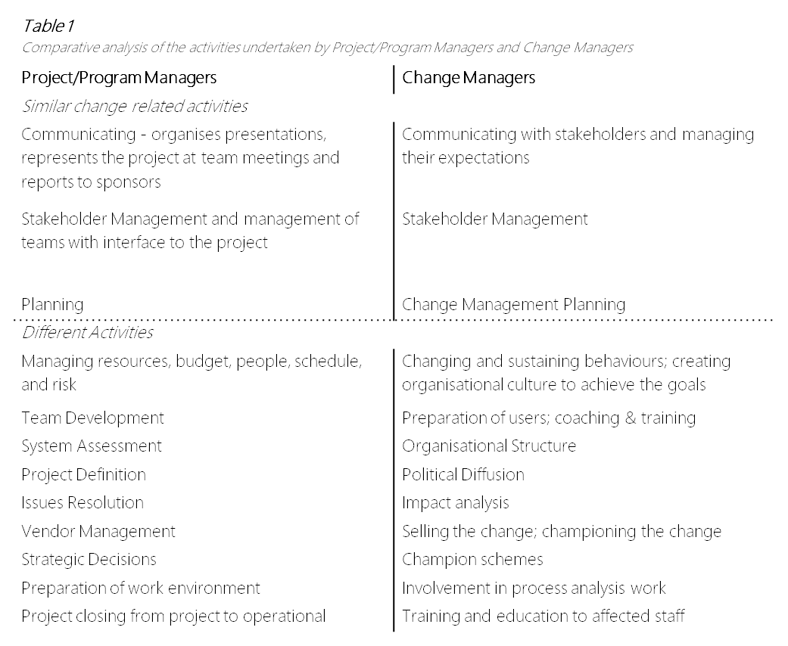
In Change, Project and Programme Managers Part 1, we discussed how the competencies between Project, Programme and Change Managers can serve to complement one another to achieve better project outcomes and increase project success rates. In the part 2 series of this blog, we are going to identify the activities that Project/Programme Managers undertake as opposed to the activities undertaken by Change Managers.
In Crawford and Nahmias' (2010) case studies spanning multiple industries, one thing of note is that the role of project and programme managers are indistinguishable as the terms project and programme are often used interchangeably. The more commonly used term used is "project". This suggests lesser recognition and understanding for the term programme. Therefore, in our comparative analysis of change-related activities, we are going to consider the activities that project and programme managers do in tandem.

The information in Table 1 suggests that Project/Programme Managers tend to focus on main Project Management activities that cover the generic process flow of Project Initiation & Conception, Definition & Planning, Project Launch & Execution, Project Performance & Control, Project Closure. They execute the technical requirements to produce a new capability for the business according a defined budget and timescale.
However, few change management related activities are conducted by Project/Programme managers in many organisations. Some similarities lie in communication, stakeholder management and planning but the Project/Programme Managers and Change Management Practitioners concentrate on different aspects of these activities. Change Management Practitioners use communication plans to engage sponsors and impacted stakeholders, sell and champion change, accelerate the diffusion of organisational policies and manage expectations of all impacted parties. In contrast, Project Managers are involved in communication activities that aim to improve "involvement in meetings, presentation of the project, and reporting particularly to sponsors" (Crawford and Nahmias, 2010).
From a bird's eye view level, there is a tendency for Change Management Practitioners to focus more on engagement rather than management of stakeholders; emphasising the maximisation of Return Of Investment (ROI) through impacted users' adoption, the efficiency of use, and how quickly they take up the change. On the other hand, Project/Programme Managers, are more in tune with the idea of stakeholder management; a wider range of stakeholders may be identified but the main priorities of a Project/Programme Manager revolve around on team members and project interfaces. Change Management Practitioners plan to effect and embed required behaviour changes through a focus on the directly impacted people while Project/Programme Managers plans for the project through a more technical lens.

The shortfall is without the complementary integration of both Project and Change Management activities, the success rate of the project/change is likely to be under 30% (assuming that Project Management is executed appropriately and consistently without Change Management). How do we account for the successful projects without change management?
This small number of successful projects have a fortunate combination of the following factors:
- High level of Support provided by the Leaders/Sponsors
- Simple and Small degree of Change that impacts few groups of employees i.e. low disruptiveness
- High Organisational Change Readiness - many of the impacted employees are supportive of the change
We'll elaborate on this topic in part 3 of this series but if your organisation has yet to incorporate Change Management with Project Management, wait no longer. Unless your employees embrace the change and adopt the behaviours necessary to create the outcomes of the project, you're leaving a huge part of the success - which we measure in improved business performance - of your project to chance.
CMC Partnership provides Prosci® Delivering Project Results - a one-day, engaging and results-orientated workshop which is specifically designed to explain to Project Managers how the two disciplines can come together and integrate for the benefit of both the project and the change required, in order to deliver the expected business results. Participants will gain awareness of how change management can help them meet a Project’s intended outcomes.
Sign up now.
The upcoming Prosci® Delivering Project Results workshops are to be held in London on 6th June or in Singapore on 3rd July. If you're a Project/Programme manager or someone interested in managing transformational change within your organisation, register below.
References
- Crawford, L. & Nahmias, A. H., 2010. Competencies for managing Change. International Journal of Project Management 28 (2010) 405–412
- Smid, G., Van Hout, E., Burger, Y., 2006. Leadership in organisational change: rules for successful hiring in interim management. Journal of Change Management 6 (1), 35–51.



